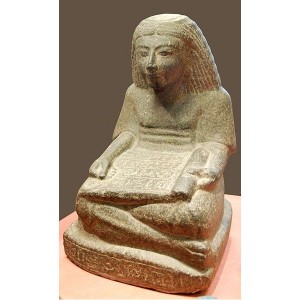 What do you think of as the oldest occupation on earth? Does your mind immediately go to Rudyard Kipling’s coined reference as the oldest profession in the world – prostitution? Maybe so, but who accounted for the trade? If there was an exchange of goods, then there had to be an accounting in one form or another, albeit very basic. Accounting has simply been a practical matter of keeping track of exchanges for as long as there were things to trade.
What do you think of as the oldest occupation on earth? Does your mind immediately go to Rudyard Kipling’s coined reference as the oldest profession in the world – prostitution? Maybe so, but who accounted for the trade? If there was an exchange of goods, then there had to be an accounting in one form or another, albeit very basic. Accounting has simply been a practical matter of keeping track of exchanges for as long as there were things to trade.
Evidence of accountancy has been traced back to the times of ancient Mesopotamia. Before the era of modern luxuries like the ones provided by local movers in Guelph ON account tracking was a much less detailed process. Accounts showing expenditures and goods received and traded that are estimated to be over 7,000 years old have been unearthed. Auditing records have been found in the ancient ruins of Egypt, Assyria, Sumeria and Babylon. People relied on primitive methods to account for crops and herds.
The temple was often the apex in a community. Within the temple a form of dues had to be paid. Most paid voluntarily, but others had to answer to the accounting of the temple priests. If a debt was registered as unpaid, the priests had the right to show the Ruler evidence. That evidence was an early form of accounting. The temple may have been the first place of a constant and continual record of local commercial enterprise.
In the more conventional sense, the history of accounting can be traced back to a Franciscan Friar. Luca Pacioli has been given the name, the Father of Accounting. Pacioli did not literally invent accounting as much as he described and re-organized a rudimentary method into a more advanced system that the Venetian merchants began using with great success. In 1494 Pacioli put forth the double-entry bookkeeping practice into his journal known as Summa de Arithmetica Geometria, Proportioni et Proportionalita.
This was the first formally printed and published accounting system on record. It included a 27-page treatise on bookkeeping. Pacioli wrote mainly for the merchants to use his works as reference texts. His descriptive methods spread throughout medieval Europe, and is believed to be the forerunner to modern accounting. He was the first to introduce the plus and minus symbols which became standard notations in his time. His system layed the foundation for accounting and bookkeeping as it is practiced today.
The natural precursors of writing and money were the foundations of formal accounting, but prior to a written accounting system man kept track with stones, shells and tokens of a number of varieties. It wasn’t until the nineteenth century that accounting became an organized profession. Kings and Feudal Lords had their tax collectors, and with each farmer an accounting had to be made. If the kingdom was paid in coins or pigs each transaction had to be accounted for as an income or a debit. The profession congealed initially as solicitors for the King in Scotland where accountants were known as expert witnesses in financial transactions. They were recognized by merchants and Royals both as the final say in matters of commerce.
While accounting history is deeper and much richer than what has been portrayed in this brief article, it is safe to say that there is the distinct possibility that indeed it could be the oldest profession in the world.
What do you think? Leave your comments below.